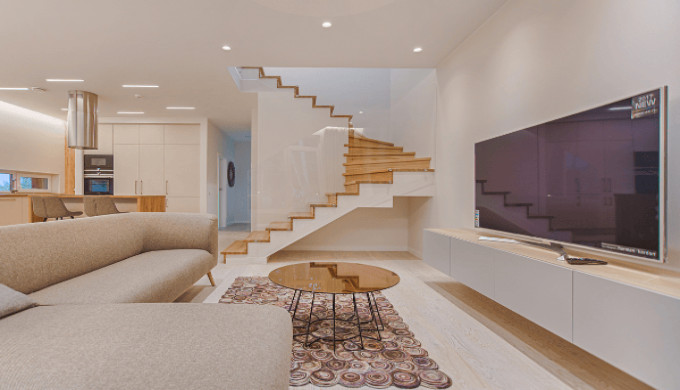
Smart homes have come a long way since their inception. What once seemed like futuristic technology is now a part of everyday life. From voice-controlled lights to security cameras that you can monitor from your phone, smart home technology has evolved in incredible ways. But what`s next? What does the future hold for smart homes, and how will they change the way we live?
In this blog, we`ll explore the evolution of smart homes and dive into what`s coming next. From next-gen smart homes to upcoming smart home devices, we`ll look at the smart home trends to watch and the future of home automation.
When you think about the smart home evolution, it`s easy to forget just how far we`ve come. In the beginning, a smart home was simply a house with a few automated features. Smart home technology started with devices like programmable thermostats, remote-controlled lights, and basic security cameras. These were things that could be controlled by remotes or through early smartphone apps.
In those early days, home automation was more about convenience than true innovation. The next big thing in smart homes was being able to control your home`s lights and temperature from your smartphone. However, these early devices lacked the seamless integration we have today. Back then, each device operated independently, and setting them up often required technical know-how.
As smart home advancements began to progress, the industry saw a shift toward interconnected devices that could communicate with one another. This paved the way for more sophisticated smart homes, which today are much more intuitive and user-friendly.
One of the most significant milestones in smart home technology evolution came with the introduction of voice-controlled assistants like Amazon`s Alexa, Google Assistant, and Apple`s Siri. These voice assistants make controlling smart devices much easier. Instead of having to open apps or push buttons, users could simply speak a command to turn on the lights, adjust the thermostat, or play music.
Voice-controlled smart homes allowed for a level of convenience that made the technology feel almost magical. These assistants became the cornerstone of the modern smart home, allowing home automation trends to flourish. As voice control became more sophisticated, the world of smart home technology began to feel more integrated.
As we look ahead, there are several smart home trends to watch. Next-gen smart homes will go beyond simple device integration. Here are some of the emerging smart home features and smart home advancements that will likely shape the smart homes of the future:
AI is already part of many smart home devices, but it`s about to get much smarter. AI-driven smart homes will be able to learn your habits and preferences, adjusting everything from lighting to temperature without you having to lift a finger. Imagine a home that anticipates your needs before you even ask, like adjusting the thermostat when you arrive home or automatically dimming the lights when it`s time for bed.
The future of home automation will be centered around more personalized experiences, with AI being able to analyze data from different devices to make your home as comfortable and efficient as possible.
As smart home technology continues to evolve, security will remain a priority. The next generation of smart homes will feature enhanced privacy and security protocols, especially as concerns about data breaches and hacking continue to rise.
Shortly, smart homes will include more advanced security measures like facial recognition technology, smarter doorbell cameras, and even AI-powered security systems that can distinguish between a stranger and a family member. These systems will be more capable of learning what`s normal for your household, alerting you only when something out of the ordinary happens.
The future smart home innovations won`t just focus on convenience and comfort; they`ll also play a significant role in helping us save energy and live more sustainably. Smart home trends in energy efficiency will include smarter thermostats, lighting systems, and appliances that help you reduce energy consumption automatically.
For example, smart appliances will not only be able to tell you when they need maintenance, but they will also adjust themselves to use less energy. Solar-powered smart homes might become more common, with energy-efficient homes that maximize natural resources like solar power while minimizing energy waste.
The next evolution of smart home control will move beyond just voice commands. While voice control is still one of the most popular methods for controlling smart devices, multimodal control will be a huge focus for smart home technology in 2025 and beyond. This could include control through gestures, facial recognition, or even emotions.
Imagine being able to control your smart home devices simply by using hand gestures or your home adapting to your needs based on your mood or health status. The future of smart homes will focus on making the experience as intuitive and natural as possible.
Furniture and appliances will also get smarter. For instance, your couch might have built-in speakers, wireless charging pads, or temperature control. Smart kitchen appliances might become more intelligent, allowing them to sync with recipes, tell you when ingredients are running low, or automatically order groceries.
Upcoming smart home devices will be embedded into everyday objects, making our homes more efficient and connected. Think of your coffee maker automatically brewing your morning coffee based on your schedule or your smart fridge suggesting meals based on what`s inside.
The next big thing in smart homes will likely revolve around AI, sustainability, privacy, and security. With emerging smart home features like multimodal control, smart furniture, and healthcare integration, the smart homes of the future will be places that anticipate your needs and make your life easier, safer, and more comfortable.
As we approach 2025, smart home trends will shift from basic automation to highly personalized and sustainable environments. The future of home automation looks bright, and it`s only a matter of time before the next generation of smart homes becomes a part of our everyday lives.